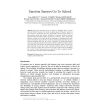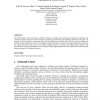3787 search results - page 28 / 758 » The Use of Agents Techniques on Intelligent Tutoring Systems |
AIED
2009
Springer
14 years 1 months ago
2009
Springer
We explored the possibility of predicting learners’ affective states (boredom, flow/engagement, confusion, and frustration) by monitoring variations in the cohesiveness of tutori...
MATES
2010
Springer
13 years 7 months ago
2010
Springer
Abstract. In this paper we focus on explaining to humans the behavior of autonomous agents, i.e., explainable agents. Explainable agents are useful for many reasons including scena...
AIED
2009
Springer
14 years 3 months ago
2009
Springer
This paper describes the use of sensors in intelligent tutors to detect students' affective states and to embed emotional support. Using four sensors in two classroom experime...
IADIS
2004
13 years 10 months ago
2004
The ALPS project (Active Learning in Problem Solving) is building and evaluating an educational technology that combines cognitive tutors with a novel interactive questioning envi...
ITS
2010
Springer
14 years 1 months ago
2010
Springer
We investigate how positive, neutral and negative feedback responses from an Intelligent Tutoring System (ITS) influences learners‟ affect and physiology. AutoTutor, an ITS with ...


